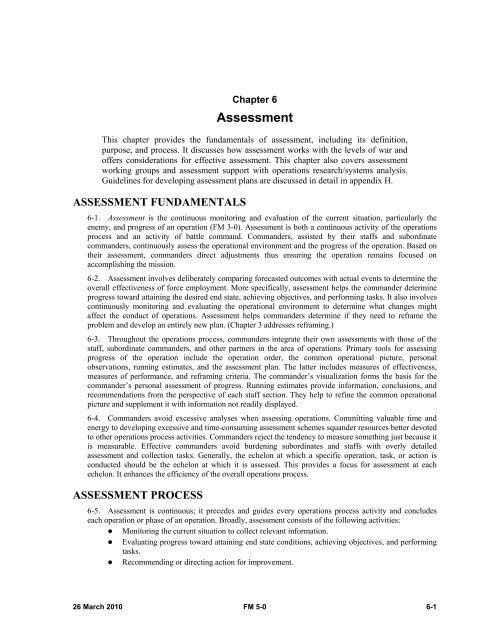FM 5-0, The Operations Process - Federation of American Scientists
FM 5-0, The Operations Process - Federation of American Scientists
FM 5-0, The Operations Process - Federation of American Scientists
You also want an ePaper? Increase the reach of your titles
YUMPU automatically turns print PDFs into web optimized ePapers that Google loves.
Chapter 6<br />
Assessment<br />
This chapter provides the fundamentals <strong>of</strong> assessment, including its definition,<br />
purpose, and process. It discusses how assessment works with the levels <strong>of</strong> war and<br />
<strong>of</strong>fers considerations for effective assessment. This chapter also covers assessment<br />
working groups and assessment support with operations research/systems analysis.<br />
Guidelines for developing assessment plans are discussed in detail in appendix H.<br />
ASSESSMENT FUNDAMENTALS<br />
6-1. Assessment is the continuous monitoring and evaluation <strong>of</strong> the current situation, particularly the<br />
enemy, and progress <strong>of</strong> an operation (<strong>FM</strong> 3-0). Assessment is both a continuous activity <strong>of</strong> the operations<br />
process and an activity <strong>of</strong> battle command. Commanders, assisted by their staffs and subordinate<br />
commanders, continuously assess the operational environment and the progress <strong>of</strong> the operation. Based on<br />
their assessment, commanders direct adjustments thus ensuring the operation remains focused on<br />
accomplishing the mission.<br />
6-2. Assessment involves deliberately comparing forecasted outcomes with actual events to determine the<br />
overall effectiveness <strong>of</strong> force employment. More specifically, assessment helps the commander determine<br />
progress toward attaining the desired end state, achieving objectives, and performing tasks. It also involves<br />
continuously monitoring and evaluating the operational environment to determine what changes might<br />
affect the conduct <strong>of</strong> operations. Assessment helps commanders determine if they need to reframe the<br />
problem and develop an entirely new plan. (Chapter 3 addresses reframing.)<br />
6-3. Throughout the operations process, commanders integrate their own assessments with those <strong>of</strong> the<br />
staff, subordinate commanders, and other partners in the area <strong>of</strong> operations. Primary tools for assessing<br />
progress <strong>of</strong> the operation include the operation order, the common operational picture, personal<br />
observations, running estimates, and the assessment plan. <strong>The</strong> latter includes measures <strong>of</strong> effectiveness,<br />
measures <strong>of</strong> performance, and reframing criteria. <strong>The</strong> commander’s visualization forms the basis for the<br />
commander’s personal assessment <strong>of</strong> progress. Running estimates provide information, conclusions, and<br />
recommendations from the perspective <strong>of</strong> each staff section. <strong>The</strong>y help to refine the common operational<br />
picture and supplement it with information not readily displayed.<br />
6-4. Commanders avoid excessive analyses when assessing operations. Committing valuable time and<br />
energy to developing excessive and time-consuming assessment schemes squander resources better devoted<br />
to other operations process activities. Commanders reject the tendency to measure something just because it<br />
is measurable. Effective commanders avoid burdening subordinates and staffs with overly detailed<br />
assessment and collection tasks. Generally, the echelon at which a specific operation, task, or action is<br />
conducted should be the echelon at which it is assessed. This provides a focus for assessment at each<br />
echelon. It enhances the efficiency <strong>of</strong> the overall operations process.<br />
ASSESSMENT PROCESS<br />
6-5. Assessment is continuous; it precedes and guides every operations process activity and concludes<br />
each operation or phase <strong>of</strong> an operation. Broadly, assessment consists <strong>of</strong> the following activities:<br />
• Monitoring the current situation to collect relevant information.<br />
• Evaluating progress toward attaining end state conditions, achieving objectives, and performing<br />
tasks.<br />
• Recommending or directing action for improvement.<br />
26 March 2010 <strong>FM</strong> 5-0 6-1















